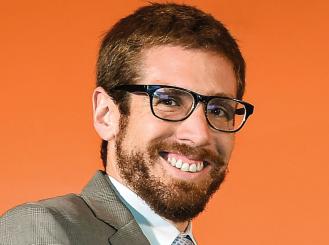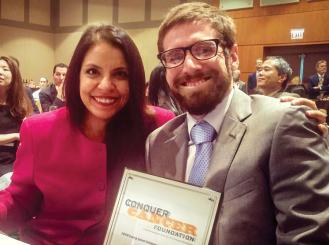Aug 24, 2016
Funding from the Conquer Cancer Foundation of ASCO (CCF) has been instrumental to three-time grant and award recipient Enrique Soto Pérez De Celis, MD, of Instituto Nacional de Ciencias Médicas y Nutrición Salvador Zubirán, Mexico City, enabling him to create the first geriatric oncology clinic in Mexico, and to start his first research project as a principal investigator in geriatric oncology.
AC: What led to your interest in the field of geriatric oncology?
ES: During my training in both internal medicine and oncology, I always enjoyed taking care of older adults, so I became interested in geriatric oncology early on. In the final year of my fellowship I received an International Development and Education Award (IDEA) from CCF, which allowed me to not only attend the 2014 ASCO Annual Meeting, but also to spend time with Dr. Hyman Muss, a renowned geriatric oncologist, at the University of North Carolina at Chapel Hill. In that same year I received a grant from the Mexican Society of Oncology enabling me to spend 4 months in the United States with Dr. Arti Hurria, who is one of the leading researchers in the field of cancer and aging. That experience made my interest in research grow exponentially.
After finishing my fellowship, I helped develop the first multidisciplinary geriatric oncology clinic in Mexico at my institution, which is now up and running, and for which I serve as Co-Director. In 2015, with guidance from my mentors, Dr. Alvaro Aguayo González and Dr. José Alberto Ávila Funes, and with the invaluable help of Dr. Hurria, I received a CCF Young Investigator Award (YIA) in memory of John R. Durant, MD, which helped me start my first research project as principal investigator, aimed at evaluating the remote monitoring of older adults with cancer undergoing chemotherapy in Mexico.
I also collaborated with Dr. Yanin Chávarri Guerra, of Instituto Nacional de Ciencias Médicas y Nutrición Salvador Zubirán, in the design of another proposal that was awarded a 2015 International Innovation Grant from CCF. This year, with Dr. Hurria’s guidance and with the full support of my institution, I successfully applied for CCF’s Long-term International Fellowship (LIFe), which will allow me to spend an additional year preparing myself and learning how to conduct high-quality research in order to help older adults with cancer in my country.
AC: Describe your YIA research project, “A Pilot Study of a Mobile Sensor-Based System for the Remote Monitoring of Functional Status in Older Adults with Cancer Receiving Chemotherapy in a Developing Country.”
ES: In low- and middle-income nations, there is a severe shortage of health care professionals, and many of the resources patients have access to in high-resource settings are not available. This is particularly true for vulnerable populations such as older adults. Many patients undergoing cancer treatment in Mexico have to travel long distances to get help if they have complications, and there is limited availability of phone services that can provide assistance. More often than not, we learn about patients’ adverse effects days or weeks after they actually occurred.
My current research is aimed at finding a solution to this problem by using mobile technology. In this project, older adults with cancer who are starting chemotherapy are provided a smartphone with an installed pedometer app, and their daily number of steps is monitored. If patients have a decrease in their step count, they are contacted using the same smartphone and asked about symptoms associated with toxicity. If toxicity is found, they are provided with guidance about the best way to solve it, including coming to the emergency room or our clinic. The goals of the project are to establish the feasibility and the acceptability of this intervention, and to determine if a decline in physical activity as measured through the number of steps per day is a good marker of toxicity in older adults with cancer. If we find that the answer is yes, this could potentially allow for earlier identification of the adverse effects of treatment. With the data collected from this study, I plan to design a larger trial comparing usual follow-up during cancer treatment with follow-up using a smartphone in older adults.
AC: What was the most exciting scientific finding made possible by your CCF grant?
ES: The project is already complete and, although the full results are not ready yet, I can tell you that our patients really enjoyed their smartphones. Although patients’ median age was 74, and most had less than a middle school education, they had no trouble using smartphones and communicating with us. While early analysis shows that we did find many toxicities earlier than we would have with usual follow-up, the most exciting finding was that patients told us they felt safer knowing that we were “with” them every day, and that having the device made them feel the quality of care was higher than what they were used to. Once we have collected all of the data, we will analyze whether the number of steps the patients take daily, as recorded on the mobile phone, correlate with toxicity.
AC: How did receiving these grants from CCF impact your career?
ES: Being awarded the YIA in memory of John R. Durant, MD, as an international oncologist was an enormous honor and a great responsibility. This grant has not only helped me to fund my research project, but it has given me the opportunity to start a career dedicated to research—something that is very difficult in low- and middleincome countries, where the shortage of health care personnel and the unavailability of resources force many physicians to abandon research and focus on clinical duties. With the LIFe, I hope to further develop my skills in order to continue developing meaningful research aimed at tackling the barriers faced by older adults with cancer in low-resource settings.
CCF grants provide an opportunity for young oncologists to obtain funding that would otherwise be very difficult to get. Although funding young people with original ideas may seem risky, it is one of the best and more effective ways to produce innovative research and to jumpstart the career of the cancer conquerors of the future. I particularly appreciate the fact that CCF’s programs transcend borders and are available to people like me, oncologists from low-resource nations who have limited opportunities in our home countries. Being a member of the CCF family is an incredible honor, and I hope to continue collaborating with CCF and ASCO in order to move the field of geriatric oncology forward.


